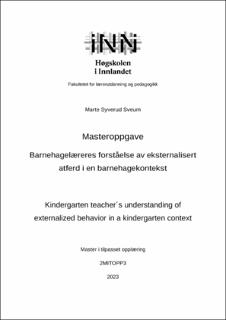Barnehagelæreres forståelse av eksternalisert atferd i en barnehagekontekst
Master thesis
Permanent lenke
https://hdl.handle.net/11250/3078313Utgivelsesdato
2023Metadata
Vis full innførselSammendrag
Tema for denne masteroppgaven i tilpasset opplæring er eksternalisert atferd i barnehagesammeneheng. Formålet har vært å få en dypere innsikt i barnehagelæreres forståelse av fenomenet eksternalisert atferd, og hva de vektlegger i arbeidet med denne atferden. Det har ikke vært et mål å generalisere funnene, men heller å bidra til refleksjon, kunnskap og utvikling av praksis.
Problemstillingen i forskningsprosjektet er derfor følgende:
Hvordan forstår barnehagelærere eksternalisert atferd i en barnehagekontekst, og hva vektlegger de i sitt arbeid med denne atferden?
Denne oppgaven har et systemteoretisk perspektiv hvor det teoretiske fundamentet bygger på Batesons kommunikasjonsteori (1972) og Bronfenbrenners bioøkologiske modell (1979). Videre er teori som beskriver hva eksternalisert atferd er, samt en beskrivelse av individperspektivet og systemperspektivet en sentral del av teorikapitlet. Avslutningsvis tar teorien for seg tidlig innsats og debatten rundt det.
Studien søker å få dypere innsikt i barnehagelærernes forståelser og opplevelser, og har derfor en fenomenologisk inngang. For å svare på problemstillingen er en kvalitativ tilnærming anvendt som metode, og studien er basert på semistrukturert intervju med tre barnehagelærere. Innholdet i intervjuene dreide seg om deres forståelse av hva eksternalisert atferd innebærer, hvordan de møter barn som viser eksternalisert atferd, samt hva de vektlegger i sitt arbeid med denne atferden. Intervjuene ble analysert ved bruk av Braun og Clarkes (2006) tematiske analyse.
Analysen av forskningsprosjektet viser at barnehagelærerne forstår eksternalisert atferd som atferd som er vendt utover. Det innebærer blant annet fysisk utagering som slag, spark, dytting og spytting. Videre blir atferden sett på som en form for kommunikasjon. Barnehagelærerne har antagelser om bakgrunner for atferden, og ser atferden i lys av både individperspektivet og systemperspektivet. Dermed har de et flerdimensjonalt perspektiv på eksternalisert atferd. I arbeidet med eksternalisert atferd blir blant annet tilrettelegging, fokus på det positive, tidlig innsats, relasjoner og foreldresamarbeid løftet frem som viktige punkt. Det kom videre frem noen utfordringer og dilemmaer som kan oppstå i arbeidet med denne atferden, og disse drøftes avslutningsvis i oppgaven. The theme for this master thesis in adapted education is externalized behavior in a kindergarten context. The aim has been to gain a deeper insight into kindergarten teacher´s understanding of the phenomenon of externalized behavior, and what they emphasize in their work with this behavior. It has not been a goal to generalize the findings, but rather to contribute to reflection, knowledge and the development of practice.
Hence the issue of this research project is the following:
How do kindergarten teachers understand externalized behavior in a kindergarten context, and what do they emphasize in their work with this behavior?
This assignment has a systems theory perspective where the theoretical foundation is based on Bateson´s communication theory (1972) and Bronfenbrenner´s bioecological model (1979). Furthermore, theory that describes what externalized behavior is, as well as a description of the individual perspective and the system perspective, is a central part of the theory chapter. In conclusion, the theory deals with early intervention and the debate around it.
The study seeks to gain deeper insight into the kindergarten teachers’ understandings and experiences, and therefore has a phenomenological approach. To answer the problem, a qualitative approach is used as method, and the study is based on semi-structured interviews with three kindergarten teachers. The content of the interviews revolved around their understanding of what externalized behavior entails, how they meet children who show externalized behavior, and what they emphasize in their work with this behavior. The interviews were analyzed using Braun and Clarke´s (2006) thematic analysis.
The analysis of the research project shows that the kindergarten teachers understand externalized behavior as a behavior that is turned outward. This includes, among other things, physical acts such as hitting, kicking, pushing and spitting. Furthermore, the behavior is seen as a form of communication. The kindergarten teachers have assumptions about the backgrounds of the behavior, and see the behavior in the light of both the individual perspective and the system perspective. Thus, they have a multidimensional perspective on externalized behavior. In the work with externalized behavior, among other things, facilitation, focus on the positive, early intervention, relationships and parental cooperation are highlighted as important points. There were also some challenges and dilemmas that could arise in working with this behavior, and these are discussed at the end of the thesis.
